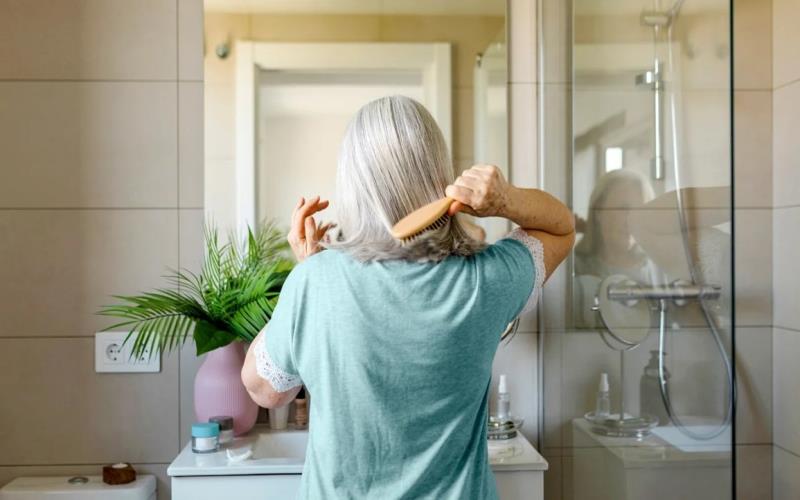Hair loss is a complex and emotionally challenging experience, especially for women. This exploration delves into six effective solutions designed to empower women in their journey against hair loss. From lifestyle adjustments to advanced treatments, each solution addresses different aspects of the multifaceted issue. By understanding these options, women can make informed decisions tailored to their unique needs, fostering a sense of control and confidence in managing hair loss.
1. Nutrient-Rich Diets: Nourishing Hair from Within
A nutrient-rich diet plays a pivotal role in promoting hair health and combatting hair loss. Women experiencing hair loss should focus on consuming foods rich in vitamins and minerals essential for hair growth, such as biotin, iron, zinc, and vitamins A and E. Incorporating a variety of fruits, vegetables, lean proteins, and whole grains ensures a well-rounded intake of key nutrients. Additionally, omega-3 fatty acids found in fish, flaxseeds, and walnuts contribute to scalp health. A balanced and nourishing diet not only supports overall well-being but also provides the essential building blocks for healthy and resilient hair.
2. Scalp Massage and Aromatherapy: Stimulating Hair Follicles
Scalp massage, coupled with aromatherapy, offers a holistic approach to stimulating hair follicles and promoting blood circulation. Gently massaging the scalp with fingertips or a soft brush enhances blood flow to the hair follicles, encouraging nutrient delivery and oxygenation. Aromatherapy infonetworth.com, using essential oils like lavender, rosemary, and peppermint, can further boost the effectiveness of scalp massage. These oils have been associated with promoting hair growth and improving the overall health of the scalp. Regular scalp massage and aromatherapy provide a soothing ritual that not only supports hair health but also contributes to stress reduction, a factor often linked to hair loss.
3. Prescription Medications: Targeting Hormonal Influences
For women experiencing hair loss due to hormonal factors, prescription medications can offer targeted solutions. Minoxidil, an FDA-approved topical medication webtoon xyz, has shown effectiveness in promoting hair regrowth and preventing further loss. Finasteride, another medication, is prescribed in certain cases to address hormonal imbalances contributing to hair loss. Women must consult with healthcare professionals before starting any prescription medications, as individual factors and potential side effects need to be carefully considered. These medications represent a more advanced approach to addressing hormonal influences on hair loss.
4. Platelet-rich plasma (PRP) Therapy: Harnessing the Body’s Healing Power
Platelet-rich plasma (PRP) therapy harnesses the body’s natural healing mechanisms to stimulate hair follicles. In this procedure, a small amount of the patient’s blood is drawn, processed to concentrate the platelets, and then injected into the scalp. Platelets contain growth factors that promote tissue repair and regeneration. PRP therapy has shown promising results in improving hair density and thickness. While multiple sessions can be required, this non-invasive and autologous approach provides an alternative for women seeking to enhance hair growth without resorting to surgical interventions.
5. Low-Level Laser Therapy (LLLT): Energizing Hair Follicles
LLLT employs low-level lasers or light-emitting diodes to stimulate hair follicles and encourage regeneration without surgery. The scalp absorbs laser light, activating cells and increasing follicular blood flow. Home-use LLLT equipment includes laser hats and helmets. LLLT has been shown to improve hair density and thickness, making it a handy choice for women seeking hair loss treatment without surgery. LLLT devices must be used regularly for best results.
6. Join Groups
Joining support groups is a proactive and empowering solution for women grappling with the challenges of hair loss. A women’s hair loss support group, specifically tailored to address the unique concerns faced by women experiencing hair loss, provides a supportive community where shared experiences foster understanding and resilience. By participating in such groups, women gain access to valuable insights, coping strategies, and emotional support from others who have navigated similar journeys. The camaraderie within a support group not only helps individuals cope with the emotional aspects of hair loss but also serves as a resource for practical advice on managing and embracing one’s unique beauty. Joining these groups becomes a crucial step in navigating the complexities of hair loss, empowering women to face the challenges with a strengthened sense of community and solidarity.
Conclusion:
In conclusion, battling hair loss requires a holistic approach that addresses underlying factors while providing immediate solutions to boost confidence. From adopting nutrient-rich diets and embracing scalp massage to exploring prescription medications, PRP therapy, and LLLT, women have a range of options to tailor their approach. Additionally, joining groups offer immediate aesthetic solutions. By understanding and combining these effective strategies, women can navigate the complex landscape of hair loss with empowerment, reclaiming control over their appearance and fostering a positive relationship with their hair and overall well-being.
